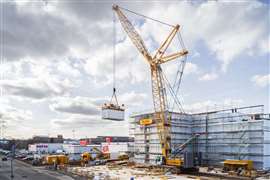Huge boiler moved in India
10 August 2022
Express Global Logistics (EXG), member to the Worldwide Project Consortium (WWPC) in India, recently transported a waste heat boiler, weighing 190 tonnes and 20 metres long.
 EXG faced several challenges including ongoing new infrastructure developments in the area (Photo: WWPC)
EXG faced several challenges including ongoing new infrastructure developments in the area (Photo: WWPC)
The cargo was moved from Yamuna Nagar- Haryana to Kandla Port in Gujarat to cover a distance of 1,600 kilometres.
A spokesperson for EXG said, “Our scope of work for transportation had some salient features and challenges that we overcame with careful planning and tapping into the expertise of our EXG team. Our operations and clearing team managed approvals from various government agencies, and port authorities to execute the project.
“Our team had to face several challenges like the ongoing new infrastructure development Bharat mala in that area, permissions from various authorities, and numerous civil work enroute to facilitate the cargo movement, but we safely delivered it.”
Advance planning
 During transport, the height of the boiler made it difficult to pass under electrical wires (Photo: WWPC)
During transport, the height of the boiler made it difficult to pass under electrical wires (Photo: WWPC)
EXG’s asset management, heavy hauling, and engineering teams coordinated to create detailed plans in advance and completed a route survey to plan for the movement of the cargo.
“EXG tackled enormous challenges during the completion of this project,” continued the spokesperson.
“The height of the boiler made it difficult to pass the electrical pole wires, road cameras, toll plaza, and signboards. To overcome these obstacles, power shutdown permissions were taken, signboards were removed, and even a bypass path was created by civil work so the package could make its way through the entire route.
 Narrow roads were another major challenge for this job (Photo: WWPC)
Narrow roads were another major challenge for this job (Photo: WWPC)
“Keeping the width of the boiler in mind, dividers had to be removed, especially at Karnal. Dividers were a major issue. The efforts of the EXG team and multiple follow-ups led to acquiring permission from NHAI to remove and reset the dividers.
“Narrow roads added to the above were another major challenge, trimming and cutting tree branches was mandatory to avoid damage to the cargo, and permissions were taken from authorities to do the same. The EXG team had to convince locals to co-operate and to put the traffic flow of local vehicles on hold so that the cargo could pass through these narrow roads.”
STAY CONNECTED


Receive the information you need when you need it through our world-leading magazines, newsletters and daily briefings.
CONNECT WITH THE TEAM












